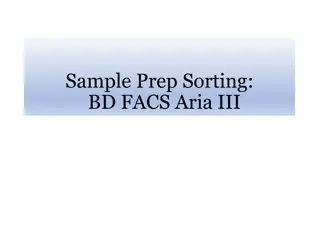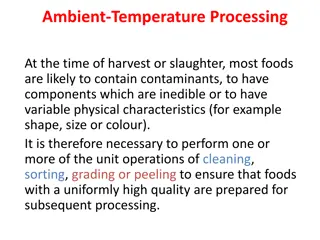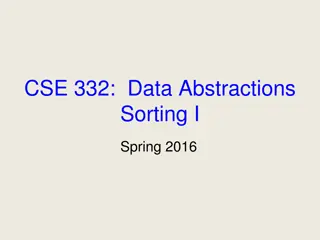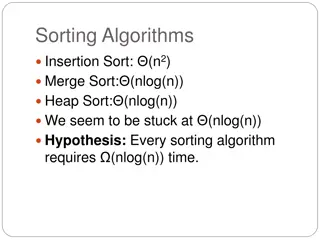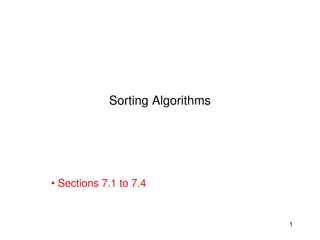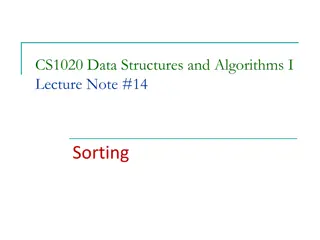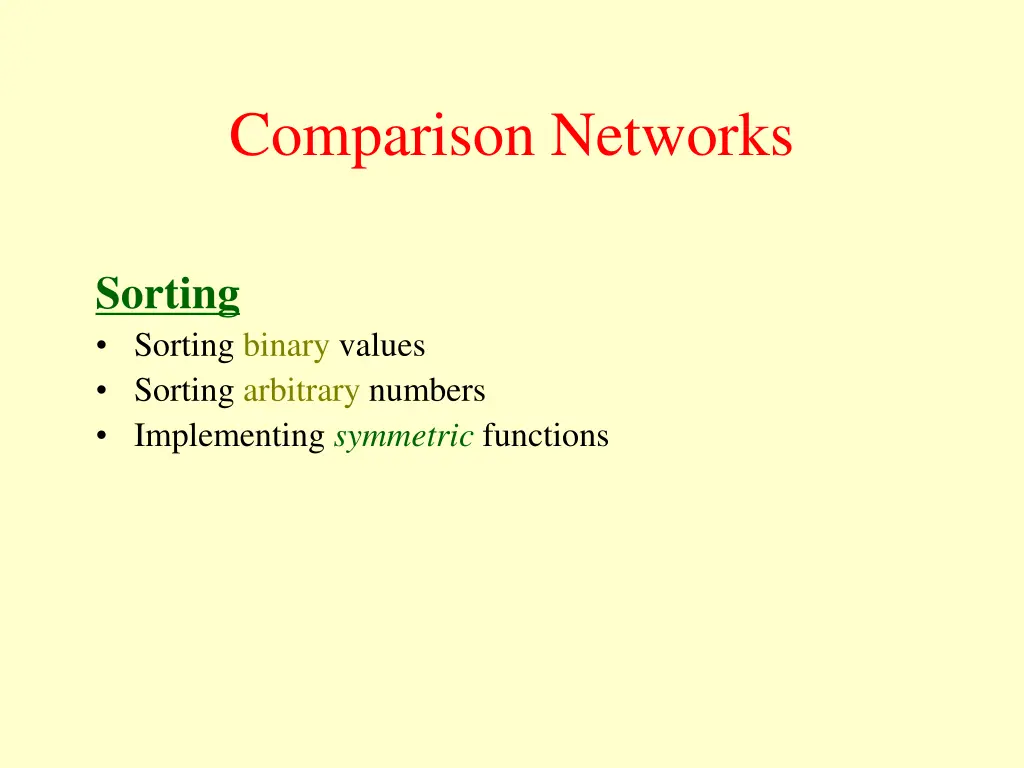
Sorting Algorithms and Comparison Networks
Explore the implementation of sorting algorithms like Mergesort and comparison networks for sorting arbitrary numbers efficiently. Learn about symmetric functions, binary values, and hardware implementation. Discover various sorting techniques and their order of comparisons to enhance computational efficiency.
Download Presentation

Please find below an Image/Link to download the presentation.
The content on the website is provided AS IS for your information and personal use only. It may not be sold, licensed, or shared on other websites without obtaining consent from the author. If you encounter any issues during the download, it is possible that the publisher has removed the file from their server.
You are allowed to download the files provided on this website for personal or commercial use, subject to the condition that they are used lawfully. All files are the property of their respective owners.
The content on the website is provided AS IS for your information and personal use only. It may not be sold, licensed, or shared on other websites without obtaining consent from the author.
E N D
Presentation Transcript
Comparison Networks Sorting Sorting binary values Sorting arbitrary numbers Implementing symmetric functions
Sorting Algorithms Example Mergesort(array[1, ,n] of Integers): begin Mergesort(array[1, ,n/2]); Mergesort(array[n/2+1, ,n]); Merge(array[1, ,n/2], array[n/2+1, ,n]); end (m ) O comparisons required to merge two arrays of size m/2 ( log n ) O n comparisons to sort n elements Order of comparisons not fixed in advance. Not readily implementable in hardware.
Sorting Networks C D B A A B C D Sorting Network Order of comparisons fixed in advance. Readily implementable in hardware. number , ) (log depth n O 2 2 of comparison s ( log n ) O n
Sorting Networks (binary values) inputs outputs 1 0 0 1 0 0 1 1 0 0 0 0 1 1 1 1 Sorting Network sorted
Comparator (2-sorter) outputs inputs min(x, y) x C max(x, y) y
Comparator (2-sorter) outputs inputs min(x, y) x max(x, y) y
Comparison Network 1 0 0 0 0 1 0 0 width n 1 0 1 1 0 1 1 1 depth d
Comparison Network 1 0 0 0 0 1 0 0 n / 2 comparisons per stage 1 0 1 1 0 1 1 1 d stages
Sorting Network Any ideas?
Sorting Network inputs outputs Sorting Network ... ... ... n 1 n
Insertion Sort Network inputs outputs depth 2n 3
Batcher Sorting Network Next Lecture 2n depth (log ) O
Sorting Arbitrary Numbers outputs inputs min(x, y) x max(x, y) y x, y can be values from any linearly ordered set, e.g., integers, reals, etc.
Integer Comparator X, Y: integers represented as m-bit binary strings. Comparison function: 1 if X > Y, 0 otherwise. C(X,Y) = Idea: use C(X,Y) to select the min and the max of X and Y.
Sorting Arbitrary Numbers 2 2 2 9 9 6 6 2 sorted 6 9 9 6
Sorting Arbitrary Numbers 1 1 1 1 5 4 4 5 sorted 4 5 5 4
Sorting Arbitrary Numbers 3 3 3 3 7 0 0 7 not sorted 0 7 7 0 How can we verify if a network sorts all possible input sequences?
Sorting Arbitrary Numbers inputs outputs Try all possible 0/1 sequences.
Sorting Arbitrary Numbers inputs outputs 0 0 0 0 000 000 0 0 0 0 0 0 0 0 Try all possible 0/1 sequences.
Sorting Arbitrary Numbers inputs outputs 0 0 0 0 000 001 000 001 0 0 0 0 1 1 1 1 Try all possible 0/1 sequences.
Sorting Arbitrary Numbers inputs outputs 0 0 0 0 000 001 010 000 001 001 1 0 0 1 0 1 1 0 Try all possible 0/1 sequences.
Sorting Arbitrary Numbers inputs outputs 0 0 0 0 000 001 010 011 000 001 001 011 1 1 1 1 1 1 1 1 Try all possible 0/1 sequences.
Sorting Arbitrary Numbers inputs outputs 0 0 0 1 000 001 010 011 100 000 001 001 011 001 1 0 0 0 0 1 1 0 Try all possible 0/1 sequences.
Sorting Arbitrary Numbers inputs outputs 0 0 0 1 000 001 010 011 100 101 000 001 001 011 001 011 1 1 1 0 1 1 1 1 Try all possible 0/1 sequences.
Sorting Arbitrary Numbers inputs outputs 1 1 1 1 000 001 010 011 100 101 110 000 001 001 011 001 011 101 1 0 0 1 0 1 1 0 Try all possible 0/1 sequences. not sorted!
Sorting Arbitrary Numbers inputs outputs 1 1 1 1 000 001 010 011 100 101 110 111 000 001 001 011 001 011 101 111 1 1 1 1 1 1 1 1 Try all possible 0/1 sequences. not sorted!
Sorting Arbitrary Numbers inputs outputs Try all possible 0/1 sequences.
Sorting Arbitrary Numbers inputs outputs 0 0 0 0 000 000 0 0 0 0 0 0 0 0 Try all possible 0/1 sequences.
Sorting Arbitrary Numbers inputs outputs 0 0 0 0 000 001 000 001 0 0 0 0 1 1 1 1 Try all possible 0/1 sequences.
Sorting Arbitrary Numbers inputs outputs 0 0 0 0 000 001 010 000 001 001 1 1 0 1 0 0 1 0 Try all possible 0/1 sequences.
Sorting Arbitrary Numbers inputs outputs 0 0 0 0 000 001 010 011 000 001 001 011 1 1 1 1 1 1 1 1 Try all possible 0/1 sequences.
Sorting Arbitrary Numbers inputs outputs 0 0 0 1 000 001 010 011 100 000 001 001 011 001 1 1 0 0 0 0 1 0 Try all possible 0/1 sequences.
Sorting Arbitrary Numbers inputs outputs 0 0 0 1 000 001 010 011 100 101 000 001 001 011 001 011 1 1 1 0 1 1 1 1 Try all possible 0/1 sequences.
Sorting Arbitrary Numbers inputs outputs 1 0 0 1 000 001 010 011 100 101 110 000 001 001 011 001 011 011 1 1 1 1 0 1 1 0 Try all possible 0/1 sequences.
Sorting Arbitrary Numbers inputs outputs 1 1 1 1 000 001 010 011 100 101 110 111 000 001 001 011 001 011 011 111 1 1 1 1 1 1 1 1 Try all possible 0/1 sequences.
Sorting Arbitrary Numbers inputs outputs 000 001 010 011 100 101 110 111 000 001 001 011 001 011 011 111 all sorted! Try all possible 0/1 sequences.
Zero-One Principle If a comparison network sorts all possible sequences of 0 s and 1 s correctly, then it sorts all sequences of arbitrary numbers correctly.
Lemma Given For a monotonically increasing function f, 0 a 0b 1a 1b
Lemma Given For a monotonically increasing function f, ( ) (0b ) 0 a 0b f 0 a f ( ) (1b ) 1a 1b f 1a f
Proof: Lemma min( , ) 0 a 0a a 1 max( , ) 0a a 1a 1
Proof: Lemma ( ) min( ( ), ( )) f 0 a f a f a 0 1 max( ( ), ( )) f a f a ( ) f 1a 0 1
Proof: Lemma f is monotonically increasing: y x ( x f ) ( ) f y ( ) min( ( ), ( )) f 0 a f a f a 0 1 max( ( ), ( )) f a f a ( ) f 1a 0 1
Proof: Lemma f is monotonically increasing: y x ( x f ) ( ) f y (min( , )) f 0a a ( ) f 0 a 1 (max( , )) f 0a a ( ) f 1a 1
Proof: Lemma f is monotonically increasing: y x ( x f ) ( ) f y (0b ) f ( ) f 0 a (1b ) ( ) f f 1a
Generalization Given 0b 0c 0 a 0 d 1b 1c 1a 1 d 2b 2c 2 a 2 d
Generalization For a monotonically increasing function f, (0b ) (0c ) f f ( ) ( ) f 0 a f 0 d (1b ) (1c ) f f ( ) ( ) f 1a f 1 d (2 b ) (2c ) f f ( ) ( ) f 2 a f 2 d (by induction)
Proof: Zero-One Principle Suppose a) the network sorts all sequences of 0 s and 1 s, b) there exists a sequence that it doesn t sort, i.e., 1 0 , a a a , such that j i a a but is placed before in the output. ,..., n a 1 ia j a j ia Define x 0 if 1 otherwise ia f (x) =
Proof: Zero-One Principle 0 a 1a 0 a 1a ... ... Sorting Network j a ia ... n a n a 1 1
Proof: Zero-One Principle ( ( ) ) ( ( ) ) f f 0 a 1a f f 0 a 1a ... ... Sorting Network ( ( ) ) f f j a ia ... ( ) f n a n a ( ) f 1 1

